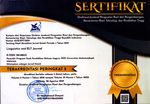Describing Self-efficacy of In-experienced English Teachers in Elementary Schools
Abstract
Keywords
Full Text:
PDFReferences
Fadilah, “An Analysis Of Error On The Use Of Simple Past Tense In Writing Narrative Text Of 42 State SMK In Jakarta,” Wanastra, vol. 11, no. 1, pp. 15–24, 2019, [Online]. Available: http://ejournal.bsi.ac.id/ejurnal/index.php/wanastra
A. P. Rahayu and Y. Dong, “The Relationship of Extracurricular Activities with Students’ Character Education and Influencing Factors: A Systematic Literature Review,” AL-ISHLAH J. Pendidik., vol. 15, no. 1, pp. 459–474, 2023, doi: 10.35445/alishlah.v15i1.2968.
A. R. Syam, “Posisi Manajemen Kurikulum Dan Pembelajaran Dalam Pendidikan,” MUADDIBStudi Kependidikan dan Keislam., vol. 7, no. 1, pp. 33–46, 2011, doi: 10.24269/muaddib.v7n1.2017.33-46.
K. M. Putri and D. Dasalinda, “The Role of the Class Teacher in the Development of Character Value in the National Education Perspective,” Edunesia J. Ilm. Pendidik., vol. 4, no. 3, pp. 1515–1530, 2023, doi: 10.51276/edu.v4i3.572.
N. Salam, A. N. Putri, T. S. Patima, A. Abdul Latiff, and A. A. Md Zamin, “Criteria of Ideal English Language Teachers as Perceived by Secondary and Tertiary Indonesian Students,” J. Soc. Transform. Reg. Dev., vol. 2, no. 3, 2020, doi: 10.30880/jstard.2020.02.03.022.
L. Lianto, “Self-efficacy: A brief literature review,” J. Manaj. Motiv., vol. 15, no. 2, pp. 55–61, 2019.
N. S. A. Bakar, S. M. Maat, and R. Rosli, “A Systematic Review of Teacher’s Self-efficacy and Technology Integration,” Int. J. Acad. Res. Bus. Soc. Sci., vol. 8, no. 8, 2018, doi: 10.6007/ijarbss/v8-i8/4611.
A. Bandura, Self-efficacy: The exercise of control. Macmillan, 1997.
T.-M. en Hoy, “Tscannen-Moran en Hoy, Capturing An Elusive Construct 2001.pdf.” 2001.
D. E. Safitri, “the Sense of Self Efficacy of Pre-Service English Teachers in Efl Context,” SAGA J. English Lang. Teach. Appl. Linguist. Safitri DE. Sense Self Effic. Pre-Service English Teach. Efl Context. SAGA J English Lang Teach Appl Linguist. 2021;2(2)121–32., vol. 2, no. 2, pp. 121–132, 2021, doi: 10.21460/saga.2021.22.79.
R. W. Griffin, J. M. Phillips, and S. M. Gully, Organizational behavior: Managing people and organizations. CENGAGE learning, 2020.
S. P. Robbins and T. A. Judge, Organizational behavior 15th edition. Prentice Hall, 2012.
D. W. Ariani and Y. S. Susilo, “Why do it later? Goal orientation, self-efficacy, test anxiety, on procrastination,” J. Educ. Cult. Psychol. Stud., vol. 2018, no. 17, pp. 45–73, 2018, doi: 10.7358/ecps-2018-017-wahy.
A. N. Rahmawati and I. N. Wirakhmi, “Self-Efficacy in Primary School Teachers,” Indones. J. Glob. Heal. Res., vol. 6, no. 2, p. 697, 2024.
B. B. Telef, “The study of teachers’ self-eficacy, job satistaftione, life satisfaction and bornout,” İlköğretim Online, vol. 10, no. 1, pp. 91–108, 2011, [Online]. Available: http://ilkogretim-online.org.tr
S. Shaukat and H. M. Iqbal, “Teacher self-efficacy as a function of student engagement, instructional strategies and classroom management,” Pakistan J. Soc. Clin. Psychol., vol. 9, no. 3, pp. 82–85, 2012.
F. Ghasemboland and F. B. Hashim, “Teachers’ self-efficacy beliefs and their English language proficiency: A study of nonnative EFL teachers in selected language centers,” Procedia-social Behav. Sci., vol. 103, pp. 890–899, 2013.
F. Depaepe et al., “Teachers’ content and pedagogical content knowledge on rational numbers: A comparison of prospective elementary and lower secondary school teachers,” Teach. Teach. Educ., vol. 47, pp. 82–92, 2015.
X. Huo and X. Huo, “Review of Research on Teachers of English as an International Language,” High. Educ. Int. English Lang. Instr. Intersect. Race Lang. Can. Univ., pp. 61–77, 2020.
I. H. Mirici and F. O. Caglar, “Reflections on practicum experiences of non-ELT student teachers in Turkey,” ELT Res. J., vol. 6, no. 3, pp. 276–292, 2017, [Online]. Available: http://dergipark.ulakbim.gov.tr/eltrj/
M. J. Haslip and D. F. Gullo, “The Changing Landscape of Early Childhood Education: Implications for Policy and Practice,” Early Child. Educ. J., vol. 46, no. 3, pp. 249–264, 2018, doi: 10.1007/s10643-017-0865-7.
Z. Rao and H. Yu, “Enhancing students’ English proficiency by co-teaching between native and non-native teachers in an EFL context,” Lang. Teach. Res., vol. 25, no. 5, pp. 778–797, 2021.
N. C. Jalmaani, “Square Peg in a Round Hole : Stories of The Non- English Major Teachers Teaching English Subjects,” vol. V, no. Xi, pp. 234–241, 2021.
H. Baniati, M. Isnaini, and M. Fauzi, “Problematika Tugas Mengajar Dengan Bidang Keahlian Guru,” Munaddhomah J. Manaj. Pendidik. Islam, vol. 4, no. 3, pp. 558–568, 2023, doi: 10.31538/munaddhomah.v4i3.455.
and M. F. U. M. Galuh Elga Romadhon1*, Dzulfikri Dzulfikri2, “NON-ENGLISH MAJOR TEACHERS’ EXPERIENCES OF TEACHING ENGLISH FOR YOUNG LEARNERS (TEYL): A PHENOMENOLOGICAL STUDY M.,” NON-ENGLISH MAJOR Teach. Exp. Teach. ENGLISH YOUNG Learn. A Phenomenol. STUDY M., vol. 22, no. 1, pp. 46–57, 2019.
R. M. Ingersoll and M. Strong, The impact of induction and mentoring programs for beginning teachers: A critical review of the research, vol. 81, no. 2. 2011. doi: 10.3102/0034654311403323.
P. Çankaya, “The exploration of the self-efficacy beliefs of English language teachers and student teachers Title,” J. Lang. Linguist. Stud., vol. 14(3), no. April, pp. 12–23, 2018, [Online]. Available: http://www.jlls.org/index.php/jlls/article/view/724
A. A. Utami and P. Kuswandono, “Exploring EFL teacher’s agency and self-efficacy in their professional practice among Indonesian EFL teachers,” Indones. J. English Lang. Teach. Appl. Linguist., vol. 7, no. 2, p. 2023, 2023, [Online]. Available: http://dx.doi.org/10.210
S. Noviani and P. Kuswandono, “Self-efficacy beliefs of English teachers from a non-educational background in the Indonesian context,” Englisia J. Lang. Educ. Humanit., vol. 10, no. 1, p. 182, 2022, doi: 10.22373/ej.v10i1.12935.
T. Aydin Yildiz, “The Relationship between TPACK and Self-Efficacy of the English Teachers of Gifted Students in Science and Art Centres: A Sample of Türkiye,” Particip. Educ. Res., vol. 11, no. 2, pp. 117–134, 2024, doi: 10.17275/per.24.22.11.2.
W. V. Hutagalung, E. Ashari, J. B. Sinaga, and A. Adam, “Inferential question on teaching and learning process,” Celt. A J. Cult. English Lang. Teaching, Lit. Linguist., vol. 12, no. 1, pp. 25–49, 2025.
JOHN CRESWELL, Educational Research - Planning, COnducting, And Evaluating Quantitative and Qualitative Research - Fifth Edition, vol. 62, no. 1. 20AD.
S. Sudirman, “Pelatihan Pengolahan Data Penelitian Pendidikan IPA Menggunakan STATA Data Analysis,” J. Pengabdi. UNDIKMA, vol. 4, no. 3, p. 621, 2023, doi: 10.33394/jpu.v4i3.8481.
F. K. Sarfo, F. Amankwah, F. K. Sam, and D. Konin, “Teachers’ Self-efficacy Beliefs: The Relationship between Gender and Instructional Strategies, Classroom Management and Student Engagement,” Ghana J. Dev. Stud., vol. 12, no. 1–2, p. 19, 2015, doi: 10.4314/gjds.v12i1-2.2.
DOI: https://doi.org/10.31764/leltj.v13i1.31427
Refbacks
- There are currently no refbacks.
Copyright (c) 2025 Putri Aulia Ramadani, Nurul Hasanah Fajaria, Enci Zarkasih

This work is licensed under a Creative Commons Attribution-ShareAlike 4.0 International License.
_____________________________________________________
Linguistics and ELT Journal
p-ISSN 2339-2940 | e-ISSN 2614-8633

LELTJ is licensed under a Creative Commons Attribution-ShareAlike 4.0 International License.
_____________________________________________________
LELTJ is abstracting & indexing in the following databases:
_____________________________________________________
LELTJ Editorial Office:













